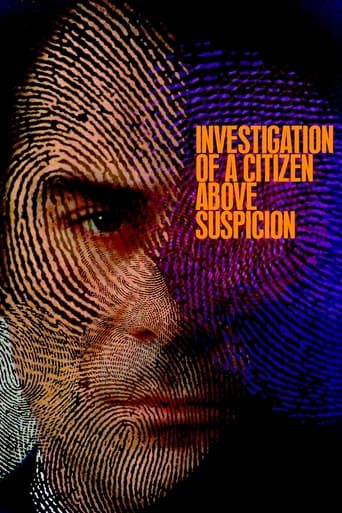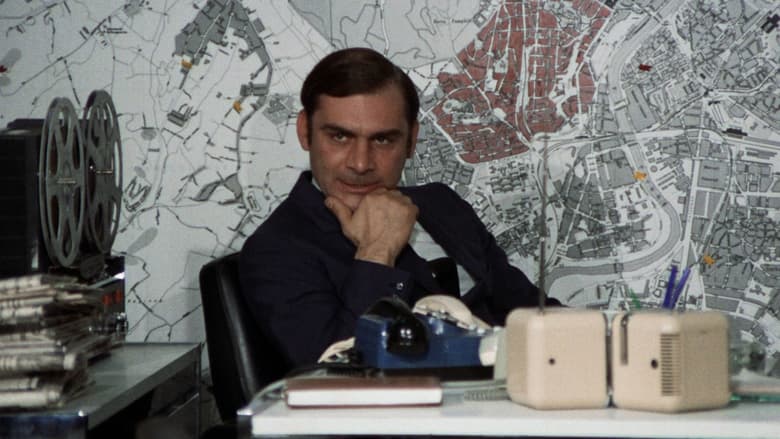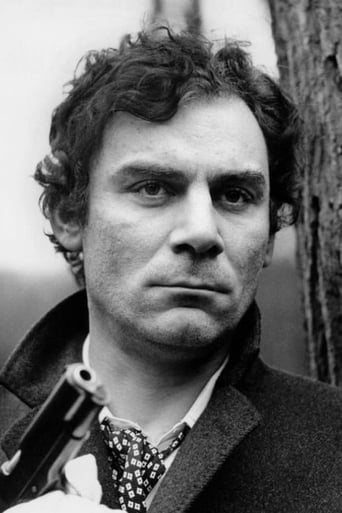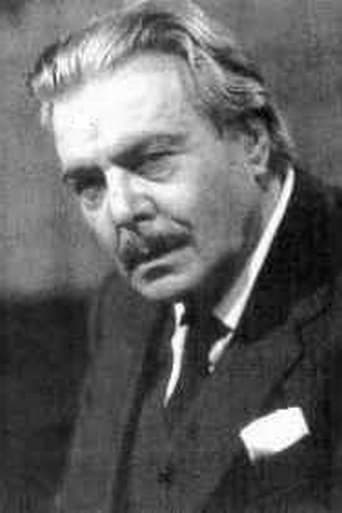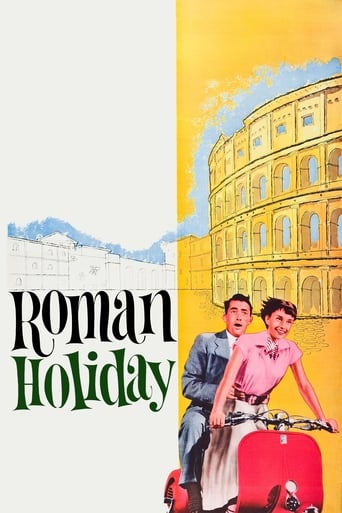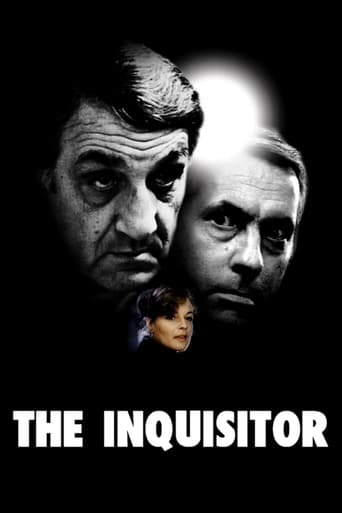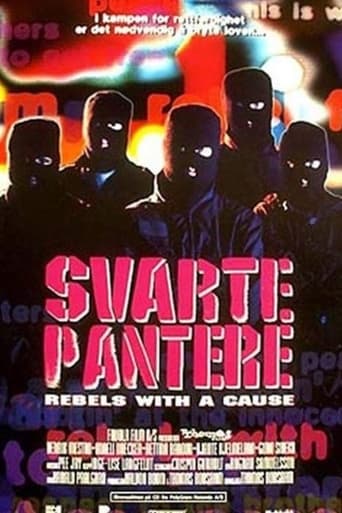Investigation of a Citizen Above Suspicion (1970)
Rome, Italy. After committing a heinous crime, a senior police officer exposes evidence incriminating him because his moral commitment prevents him from circumventing the law and the social order it protects.
Watch Trailer
Cast


Similar titles
Reviews
A lot of fun.
In truth, there is barely enough story here to make a film.
There is, somehow, an interesting story here, as well as some good acting. There are also some good scenes
By the time the dramatic fireworks start popping off, each one feels earned.
Our Hero knocks off his girl friend almost immediately as he is promoted to Police Commissioner. But it was not to celebrate his promotion - he is trying to see if he can get caught, or if he is now, in fact, above suspicion. Hedging his bets, he spends a great deal of time covering his tracks in his effort to get caught/not get caught.Gian Maria Volonte gives a hypnotic performance as the Ego Cop. Strutting and preening, he is in nearly every scene as he barks at subordinates and, in flashbacks, engages in sex with his soon-to-be-dead girlfriend, who, by the way, is a knockout. Seemed like a terrible waste of feminine pulchritude, to borrow a phrase from W.C. Fields.The pacing is good and director Elio Petri keeps the action moving at a good clip. Speaking for myself, I thought the picture hit a few false notes in the character makeup of its hero. For a man convinced he is in the clear he turns cowardly and abject when confronted by the only one who could be a witness against him - this, from a macho Alpha male? I also thought it was interesting to note the counterpoint and the hypocrisy in the theme of Democracy as an ideal, as opposed to its practical application throughout the story. Do as we say, not as we do.Good picture, but as I often think, another foreign film that has been overrated by critics and audiences trying not to appear unsophisticated, and that has now achieved cult status after winning an Oscar.
Apart from the film's own intriguing theme and interesting credentials, I had always been keen on catching this one because it had defeated Luis Bunuel's magnificent TRISTANA (1970) for the title of the Best Foreign-Language Film at the Oscars! However, the path that ultimately led me to it was quite thorny: I first caught the start of it during a rare Italian TV prime-time screening in the mid-1980s; then, after dropping off the radar for decades, it turned up again on late-night Italian TV but the reception was terrible so I could not tape it; later still, having finally acquired it on my PC, the hard disk went bust before I had a chance to make myself a copy so that, I had to get hold of it (via the same channels) all over again when the PC was back on its feet!! Even so, a whole year passed before I actually sat down to watch it (on the heels of two other Elio Petri-Gian Maria Volonte' films). INVESTIGATION OF A CITIZEN ABOVE SUSPICION won a clutch of other international awards, so it is not all that surprising to see it emerge triumphant at the Oscars as well and, after seeing it for myself, I cannot say I was displeased by that fact. In short, the film is a veritable masterpiece: brilliantly-made and utterly fascinating, albeit making for typically demanding viewing (particularly during its latter stages). As can be gleaned from the title, the plot revolves around a crime (actually, the murder of his mistress) committed by a highly-respected public official: ironically, the culprit is none other than the exiting Chief of the Homicide Squad (Gian Maria Volonte' who is on fire throughout as the megalomaniac protagonist) on his way out to becoming the Head of Political Intelligence and which, of course, he has the duty to investigate himself! This he does with complete confidence and not a little trickery (destroying and/or planting evidence, deviating the path of the investigation but at the same time admitting to his new superior of having known the victim, etc). His unusual relationship with the latter (sensuously played by Florinda Bolkan), then, is seen via intermittent flashbacks: she is a libertine (much is made of the fact that she possesses no underwear!), initially getting in touch with Volonte' almost in jest and, eventually, playing the willing murdered party(!) in re-enactments of crimes of passion solved by him throughout his illustrious career (of which he, unashamedly, also keeps photographic records). Other important figures to feature in the narrative are: Arturo Dominici (from Mario Bava's BLACK Sunday [1960]) as Volonte''s long-suffering successor; a young student radical who lives in the same apartment block as Bolkan and of whom Volonte' was jealous; and Salvo Randone (like the star, a Petri regular) as a confused old man to whom the pompous anti-hero actually confesses his guilt in the matter and bullies into turning him over to the Police but the latter, naturally, is shocked to see him lording it at the Homicide bureau! For all the social and political relevance of Petri and frequent collaborator Ugo Pirro's Oscar-nominated script culminating in a delicious double ending (Volonte''s quasi-surreal exoneration by his colleagues, after he professes to have committed the ultimate sacrifice for the good of Established Law & Order, is revealed to have been mere wish-fulfillment on his part with the true development of the facts cleverly left to the audience members' own judgment) the element which has perhaps been mainly responsible for securing the film its longevity is Ennio Morricone's celebrated bizarre (i.e. half-urgent, half-playful) score which definitely ranks among his finest works, and that's saying a lot!
Some comments in light of previous descriptions of the movie. This movie is definitively about state violence. Even if to a viewer that has no foreknowledge of the police state that was instituted in Italy (with the help of the CIA as the movie alludes to) in order to keep the Communist Party from taking power (the PCI had the biggest following of any parties at that time), the fact remains that the movie is not much more surreal than the socio-political reality facing the film-maker. Murders and "suicides" (while in police custody) of left-wing political activists and of anarchists are a fact that Elio Petri was painfully aware of. He made a documentary called "Streghi dello stato" "witches of the state" where Jean Maria Volonte and others expose such "suicides". Elio Petri was politically aware and through out his work there is criticism of the right wing of Italian politics (see TODO MORO). I think that the movie is most powerful once you are aware of the fact that you can be victimized at the hands of an institution, esp. at the hands of an institution that exists only to maintain political order. Once the politicization of the priorities of those institutions that have the legitimate use of violence occurs, than meaningless violence towards the innocent will be allowed if punishing it would impair the political functions of the state machinery. Flora Balkan is perhaps a symbol for the masses, their love of violence and power, their love for the undoing of their freedoms. A very fine movie that requires some effort, but that is always actual - thanks to an interesting narration of human nature. The movie does have it's flaws and i the action is not as invigorated as one expects it to be after the first 15 minutes, neither is the camera work at the level it has to be for this movie to be the greatest ever but it is still a hell of a great movie. Whether or not you agree with this movie's negative portrayal of state violence and of that primal attraction that violence has (explored in a marvelously Mediterranean style in this movie) for so many could make the difference in how much you are puzzled by the movie. If you see it a a satire of power and violence - it might work.
(Includes spoilers) Elio Petri made many trenchant political and social satires. Among the best of these were "We Still Kill the Old Way," about a professor who fruitlessly and fatally takes on the Mafia; "The Working Class Goes to Heaven," about the dehumanizing impact of factory life on the individual; and "Todo Modo," a brutal attack on the Christian-Democratic rule of post-war Italy. Petri was a member of the Italian Communist Party.In "Investigation of a Citizen Above Suspicion" he dissects corruption at different levels of Italian society. His main character is a police inspector who kills his mistress while they have sex. She acts out fantasies for him of famous crimes. "How will you kill me this time?" she asks. "I'll cut your throat," he says. A few minutes later he slices her throat with a razor.She had taunted him for his sexual inadequacy, a condition which unnerves him, but what motivates him to commit the murder is the sense that as new head of political intelligence (coming from the homicide division) he can feel confident in being "above suspicion." He places deliberate and obvious clues everywhere. While holding himself above the law, however, he wants to test its effectiveness and actively takes part in the investigation.At first the police focus on the dead woman's homosexual husband and then on an anarchist student with whom she is having an affair. The inspector comes to realize that the conviction of an innocent man will not guarantee his own immunity from the law. So he must concoct a test, which if his superiors deny it, will be the ultimate test of his power. "Investigation" is really a portrait of deranged right-wing fascistic power, with its easy enemies of gays and leftists.Appearing almost completely unemotional beneath an often stormy exterior, Gian Maria Volonte' gives a stunning portrayal of a complex paranoid character entirely dedicated to upholding the law. Yet he is brazenly willing to use his authority for his own ends, logic be damned.This film caused a furor in Italy because of its unflattering portrayal of the police. Its real strength lies in is psychological insight into the deranged quest for power: personal, sexual, political. The movie won the Academy Award for best foreign film in 1970.

